“I don't like Mondays”
The danger of boredom, the decline of liberalism, and the wisdom of Heschel
I’ve read a lot of critiques of liberalism, but this one is new to me:
Here’s a similar analysis by Francis Fukuyama:
Or consider this excerpt from a Washington Post article about boredom:
BOREDOM KILLS, and those it does not kill, it cripples, and those it does not cripple, it bleeds like a leech, leaving its victims pale, insipid and brooding. Examples abound.
From science: Worms trained to find water by crawling through a plastic tube soon get bored with the trick. Rather than repeat the simple-minded maneuver, they stop wiggling and die. Rats kept in comfortable isolation quickly become jumpy, irritable and aggressive. … Humans kept in sensory-deprivation rooms report grumpiness, a willingness to believe in ghosts and hallucinations about little yellow men with black caps.
From the news: A 16-year-old girl in San Diego three years ago opened fire on an elementary school across the street from her house. With a .22-caliber rifle, she killed the school’s principal, a janitor and wounded eight children. In the midst of her sniping she called a local newspaper and said: “I don’t like Mondays. This livens up the day.”
From history: King Louis XIV, France’s enlightened “Sun King,” was afflicted one summer in Holland with a deadly boredom. He’d gone up from Paris in 1673 to lay siege to a Dutch fortress, bringing along his queen, his mistress, his former mistress and 150,000 troops. King Louis had figured the siege would take all summer. Instead, it lasted only 13 days. The king and his fractious entourage had time on their hands. A defense minister wrote home: “His Majesty is no longer troubled, except by what to do with his armies.” With nothing better to do, Louis attacked a German city, infuriating the German and Spanish Hapsburgs, forcing them to take sides with the Dutch and prolonging a bloody war for five years.
From literature: The “delicate monster” of boredom, Baudelaire warned, would one day eat the entire world in an immense yawn.
…
The brain — whether a worm’s, a rat’s or a human’s — needs something to chew on. At its simplest level, boredom is the brain’s pained response to nothingness or to endless repetition. The discomfort of boredom, like the gnawing of an empty stomach, is the brain’s way of saying it’s hungry.
…
There is considerable evidence that many Americans suffer from a boredom which, in the most literal way, amounts to what Kierkegaard called “sickness unto death.”
…
In Jimmy Carter’s White House, former speechwriter James Fallows remembers there was “a constant yearning for a crisis to manage.” A crisis, Fallows says, was considered “so much more exciting and more fun than just business as usual. If you had a crisis to manage, you didn’t need to think about what to do with your time.”
…
Dr. Ramey, the Georgetown School of Medicine physiologist and student of boredom, says the human brain reacts to boredom by either atrophying or groping for diversion. Boredom, in the best of all possible worlds, can be productive — a necessary interlude before useful, creative efforts. But too much of it, Ramey says, turns the brain inward, cannibalizing itself. Memory fades and the brain can’t figure out what to do next.
So… boredom is a threat to liberal democracy because it makes smart people do stupid and self-destructive things.
What, then, is the antidote to boredom?
Here’s one:
Religion, for [Rabbi Abraham Joshua] Heschel, is not a matter of accepting a set of beliefs. Religion is a way of knowing the world, a unique way of apprehending reality. And the opposite of religion is not doubt or disbelief or secularity. The opposite of religion is boredom — to look at the world and find nothing engaging, nothing surprising. The opposite of religion is to miss an essential element of reality — its mystery, its grandeur — it is to witness the sunset and just push down the car’s sun visor without a moment of amazement and wonder.
Or in the words of Heschel himself:
Does Judaism provide the only path to “radical amazement”?
Of course not.
But Jewish tradition does provide a specific path, a technique, a template (a system?) to help you see the world with fresh eyes.
Shabbat shalom…
If you’re an observant Jew, then Shabbat (aka the Sabbath; the Seventh Day) is the time each week when you’re commanded to put away your mobile phone, turn off your TV and computer, and cease working and spending and driving and striving and creating.
Instead, you’re called upon to spend time with family and friends… to tell and discuss the Jewish communal Story… to share a good meal… to take a leisurely walk around your neighborhood or through the woods… and maybe take a nap.
Is there a risk that without all the usual distractions, you might find the Sabbath boring? Is there a danger that without all the usual distractions, you might find yourself alone with your own thoughts instead of with someone else’s — and that your sudden self-awareness might be terrifying?
Yes, absolutely. That is a risk. But there’s also a potential reward.
The reward (I think) is that once a week, you have the time and opportunity to become fully conscious that you are alive, that you exist — right here, right now — in this mysterious and wonder-filled world. That life is a blessing. That you matter. And that you are not alone.
(G*d was the first to observe this day of rest, of course. After six days of Creation, He not only looked back to admire his handiwork (“… and G*d saw that this was good…”). He also must have found solace knowing that finally, after a very long wait, He too was no longer alone.)
Here’s what puzzles me…
If:
Boredom is a threat to liberal democracy, and…
Religion can serve as an effective antidote to boredom, but…
… in a modern secular liberal democracy, that antidote can not (and should not) be promoted in the public square…
Then:
How does a secular liberal democratic society generate a sense of wonder and communal hope — and avoid the potentially fatal side effects of boredom?



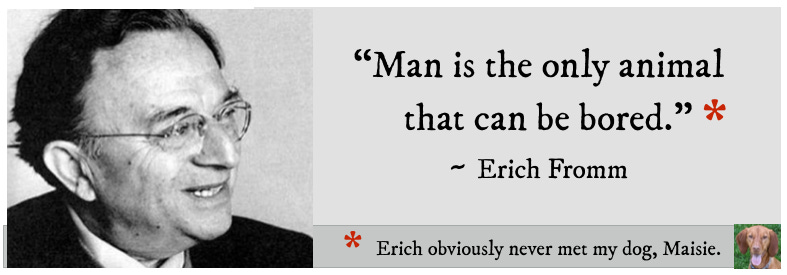
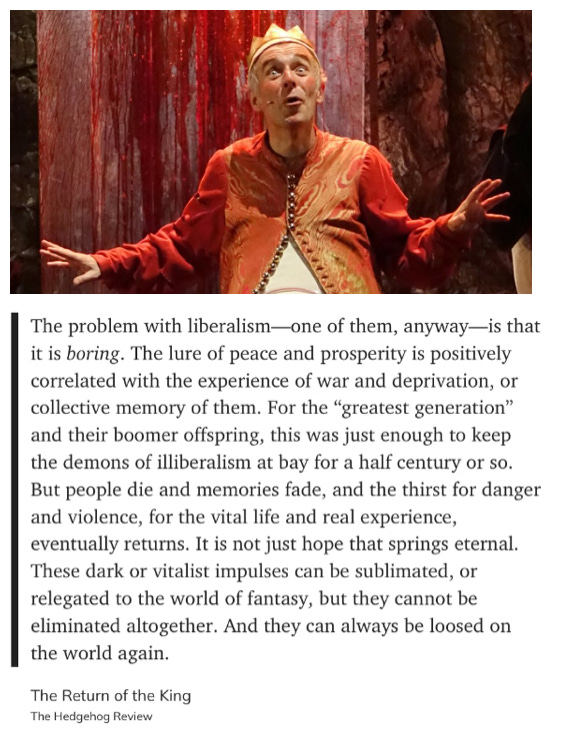
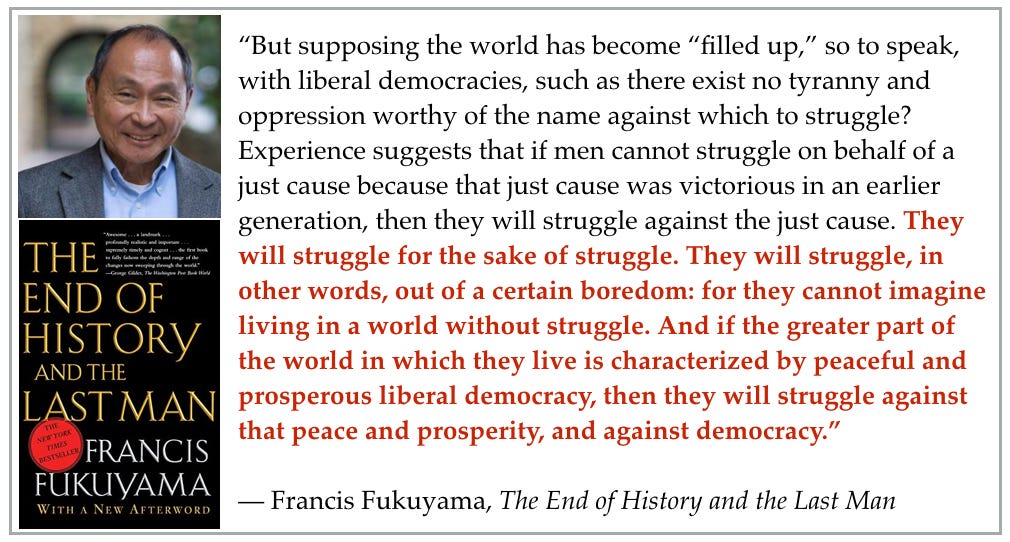
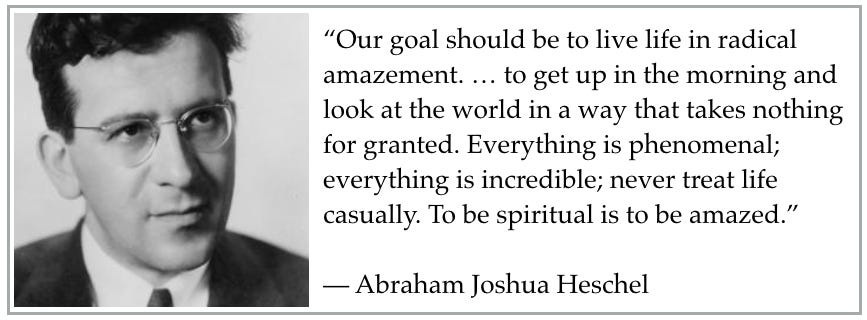

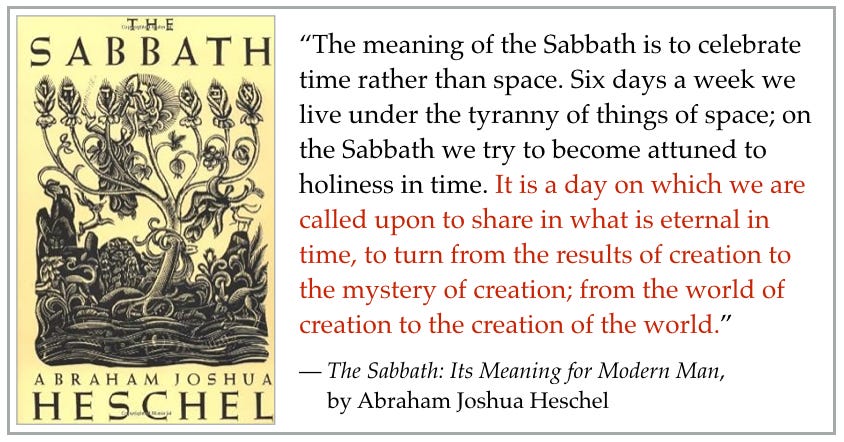
Fascinating insight Alan.